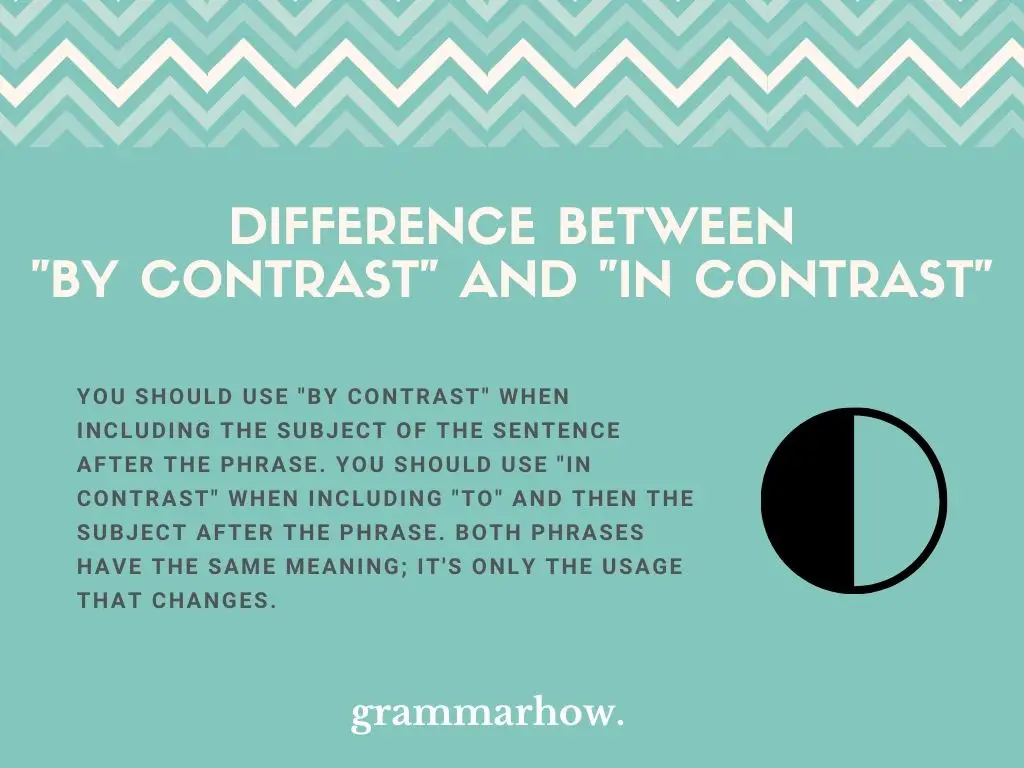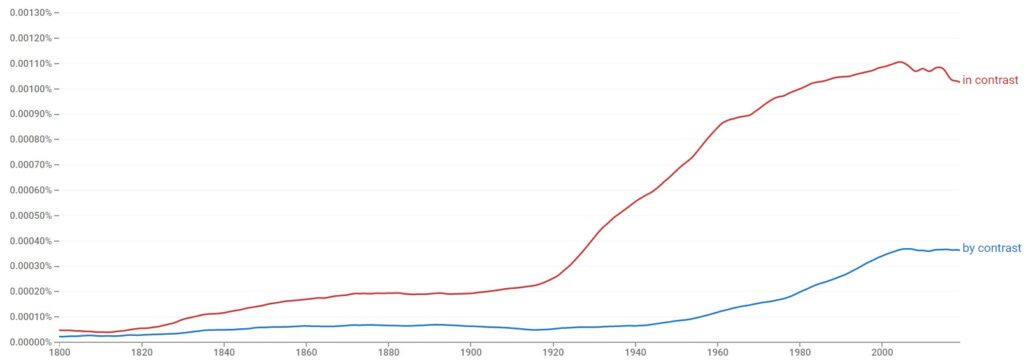“By contrast” and “in contrast” use two different prepositions to come up with different uses for each. It will help you to understand what those different ways to use them are before you use them. This article will explore those differences.
What Is The Difference Between “By Contrast” And “In Contrast”?
You should use “by contrast” when including the subject of the sentence after the phrase. You should use “in contrast” when including “to” and then the subject after the phrase. Both phrases have the same meaning; it’s only the usage that changes.

The definition of “contrast,” according to The Cambridge Dictionary, is “an obvious difference between two or more things.”
What Does “By Contrast” Mean?
To help you understand them better, we’ll go over what the differences between them are. For the most part, the meanings are the same, but the way they’re written is what changes.
“By contrast” means that we’re comparing two or more things to see how they compare against each other. We write the subject directly after the phrase, and no other prepositions are needed. A comma is always present after “by contrast.”
To understand what we mean by this, here’s an example:
- By contrast, this is much more expensive than the other one I saw.
- Dogs are great. Cats, by contrast, are not so great.
As you can see, punctuation is the key difference here. We always include the subject of the sentence next to “by contrast,” but we need punctuation in the form of commas for it to make any grammatical sense.
“By contrast” is treated as a parenthetical element, which usually means we can remove it without changing the meaning of the sentence. It simply adds extra information for the reader.
What Does “In Contrast” Mean?
“In contrast” means the same as “by contrast,” and we use it to compare two or more things with each other. The difference is that we don’t use any commas with it, and we use the preposition “to” when comparing the things.
It might help you to see quick sentences to work out the difference:
- In contrast to what I know about you, you’re not as bad as I thought.
- This doesn’t work well in contrast to my other designs.
As you can see, there isn’t as much need for a comma after “in contrast” in any case. If we write it at the start of a sentence, we put the comma t the end of the clause. If it comes in the middle, we don’t need any commas.
The punctuation difference is the easiest thing to tell apart. It’s also one of the key aspects why people prefer to use “In contrast” over “by contrast.”
Is “By Contrast” Or “In Contrast” Used The Most?
We mentioned above that “in contrast” is the more popular choice over “by contrast,” but it might help you to see a visual representation of that.
According to this graph, “in contrast” is used the most. Native speakers prefer to use it instead of “by contrast” because it uses fewer punctuation rules and makes more sense to include in most sentences.

Both phrases have grown in popularity over recent years. However, it seems unlikely that “by contrast” will ever be the more popular choice over “in contrast” because it’s too dependent on its language rules.
Also, because “by contrast” is a subordinate clause, it makes it obsolete to place it in a sentence. Since it’s clear when we’re comparing two or more things already by the context, “by contrast” seems like a waste to include when it could just as easily be removed.
- Humans will outlive their troubles. The dinosaurs, by contrast, were destined for extinction.
- Humans will outlive their troubles. The dinosaurs were destined for extinction.
As you can see, “by contrast” isn’t always necessary in a grammatical sense.
Examples Of How To Use “By Contrast” In A Sentence
Some examples might help you to understand a little more about each phrase and how we might use them.
- Many species are beginning to die out. By contrast, the population of this planet is multiplying more rapidly than ever.
- It’s hard to be a youth in the current climate. Being an adult, by contrast, is much easier for many reasons.
- You should always visit your dentist for a toothache. A doctor, by contrast, isn’t always trained in how to help you.
- There are many things that the police force can’t do. By contrast, a vigilante can live outside the law to bring justice.
- There are many things that I don’t like about school. The youth program, by contrast, seems very welcoming to me.
“By contrast” requires commas because it adds information to the clause that the reader might not otherwise get.
Examples Of How To Use “In Contrast” “n A Sentence
We can use “in contrast” in similar ways, though it doesn’t come with any extra punctuation rules.
- Baseball is a long-winded and boring sport in contrast to soccer, which is over before you even know what hit you!
- In contrast to popular beliefs, you’ll have a much harder time making friends when you’re a kid than when you’re an adult.
- This should work well in contrast to my other paintings, but I don’t think I can afford it.
- This state is poor in contrast to most of the other ones nearby.
- Most countries in this continent are on the verge of war in contrast to the peacefulness and serenity in the country that I come from.
“In contrast” always comes with the preposition “to” before comparing two or more entities.
By Contrast – Synonyms
Finally, let’s look at some synonyms and alternatives for both phrases. They both mean the same thing, which helps us to explore different synonyms for both.
- By comparison
- Conversely
- On the other hand
- Next to
- Against
- Beside
In Contrast – Synonyms
While “in contrast” means the same thing, we use it in different ways. Some of the synonyms below work much better to replace the general usage of “in contrast” rather than “by contrast.”
- As opposed to
- Contrary to
- Compared to
- Contrasted to
- Compared with
- In comparison
You might also like: In Contrast To vs. In Contrast With – Difference Explained (12 Examples)
